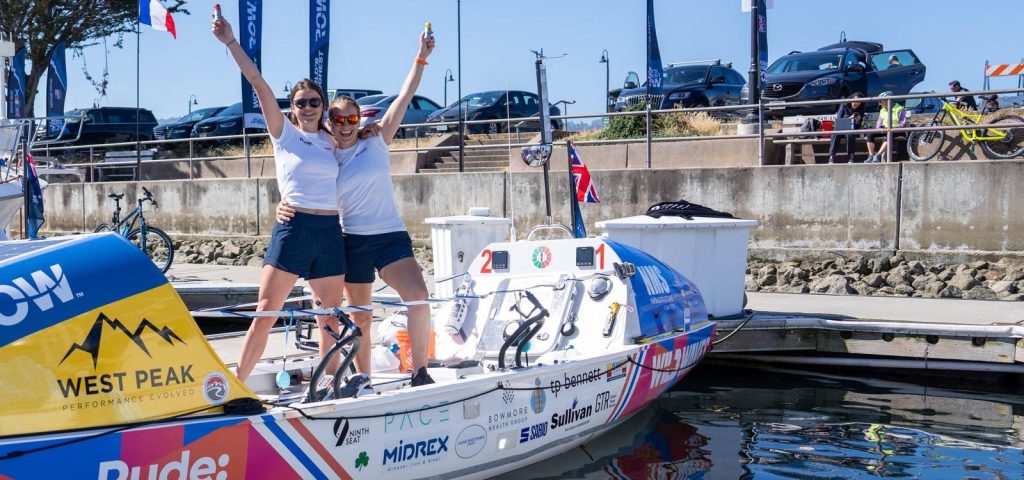When it comes to extreme sports and record-breaking feats, the stories of individuals who push the boundaries of human potential are as compelling as they are inspiring. These trailblazers not only defy physical limits, but they also demonstrate extraordinary mental resilience and determination.
Among them are Charlotte Harris and Jessica Oliver—known as “Team Wild Waves”—the dynamic duo who, in 2022, set the world record for the fastest female pair to row across the Atlantic Ocean, covering 3,000 miles in just 45 days, 7 hours and 25 minutes.
As they prepare for their next audacious challenge—rowing 2,800 miles across the Pacific Ocean from California to Hawaii—the question arises: what psychologically enables such remarkable achievements? Through their journey, and with insight from psychological research, we learn what it takes to excel and accomplish seemingly impossible goals.
1. Trusting, Enjoying And Adapting To The Process Of Becoming Great
Psychologists suggest that extreme and alternative athletes exhibit distinct personality traits compared to more traditionally skilled athletes. According to research, these extreme athletes tend to be more reserved, self-sufficient and sensation-seeking than traditional athletes.
This suggests that they are more inclined to seek novel and intense experiences, thrive in spontaneous environments and adapt quickly to changing situations. These traits enable them to perceive the external world differently—which, in turn, allows them to remain flexible and responsive when faced with uncertainty and danger.
Harris and Oliver embody these traits perfectly. Reflecting on their experiences, they shared, “Being good and doing good (winning!) has been our motivation. Not to mention, we have more fun than any other team out on the water. We have to have the fun element, otherwise the winning doesn’t happen.”
“Our goal as a team is to be flexible without overthinking,” they explained. They expressed that their coaches, along with friends, family and partners like Ryde who share the same sentiment make these wins possible.
This perspective is what separates them from their competitors: they see the ocean as their playground—a vast expanse where each wave presents an opportunity to excel and enjoy. While winning is a significant goal, the journey itself is celebrated as an avenue for adventure.
While physical prowess is undeniably crucial in breaking world records, it is the mental outlook that often distinguishes successful athletes. This mindset requires the ability to adapt, be flexible and derive joy from the process itself.
2. Wielding The Power Of Self-Affirmation
Studies suggest that self-affirmations and mantras can play an integral role in pushing athletic boundaries by facilitating achievement, as well as in aiding athletes to adapt responsively to setbacks. These affirmations help athletes maintain their focus, build confidence and recover quickly from errors. However, how athletes choose to affirm themselves is ultimately personal—and may be a critical factor that differentiates good athletes from great ones.
For Harris and Oliver, self-affirming mantras play a transformative role in their journeys. They shared, “We have this saying: ‘It is what it is. F*** it. Lessons learned.’ We think that’s really important… If something goes wrong or it doesn’t go to plan, we are very much like, ‘Okay, change, move on.’ This mantra has transcended the water into all areas of our lives.”
Their approach is a fantastic example of how affirming yourself and your abilities empowers you to bounce back from mishaps along the path to greatness. Reminding yourself that missteps are not failures or obstacles, but rather opportunities to learn more about what it takes to reach your goals, is the key to making seemingly impossible achievements become attainable.
This kind of perspective not only fuels physical endurance, but also fortifies mental resilience. With these mantras, you simultaneously remind yourself and affirm the fact that you are a formidable, competent contender in any challenge you undertake—even when the seas literally or figuratively get rough.
3. Embracing Setbacks As An Opportunity To Grow
In psychology, mindsets regarding skills, competence and achievements are categorized into two types: fixed and growth. Those with a fixed mindset believe their abilities are innate and unchangeable, while those with a growth mindset believe their abilities can be developed and improved over time. According to research, high growth and low fixed mindsets are most conducive to excellence and coping in sports.
Reflecting on their Atlantic journey, Harris and Oliver said, “We spent a lot of time getting upset about the weather. People kept saying, ‘Oh, you know, the weather is going to be with you.’ It just never came, and we got really frustrated by that. Finally, we thought—look, let’s control the controllables. Are you eating well? Are you resting well? Are you looking after yourself? Are you growing as much as possible? And then the rest doesn’t matter.”
Even though some things will always be outside our control, the importance of understanding that the most fundamental aspects of our journeys are within our control cannot be overstated.
Harris and Oliver emphasized the importance of maintaining this kind of mindset: “When one of us is tired, cranky or disengaged from the conversation, we say ‘LT.’ Nothing more, nothing less. LT stands for Low Tolerance. The other makes a hard stop, no questions asked.”
Viewing your abilities as fixed can create barriers when setbacks arise. Challenges may feel insurmountable when you believe your present skills and circumstances are as good as they can get; this subliminally discourages your own progress. However, recognizing that your skills and competencies grow with each step taken toward a goal can transform setbacks into invaluable opportunities for progress.
This growth mindset allows individuals to face their difficulties with a constructive attitude—whether it be in a hobby, a job or a dream. By persisting through challenges resiliently, we keep moving forward, and obstacles become stepping stones for personal development and success. Embracing this mindset empowers athletes and everyday people alike to see every hurdle as a chance to become stronger, adapt and thrive on their journey to greatness.
A full interview with Team Wild Waves discussing their feats can be found here: Two Extreme Athletes Explain What It Takes To Become A World Record Breaker
Read the full article here






